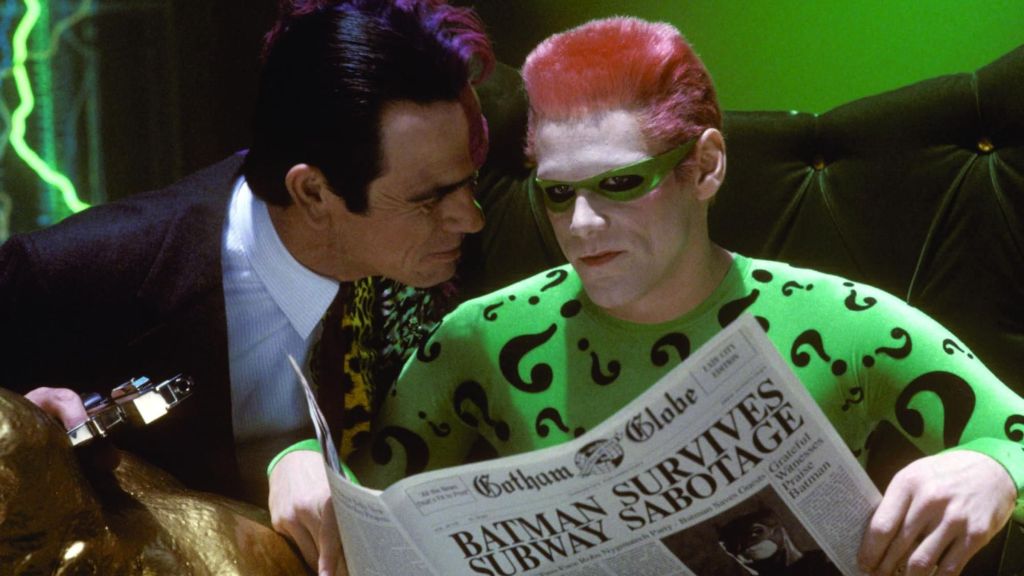Articles
DC’s New Batman ’89 Sequel Kills One Idea About Tim Burton’s Batman Movie Universe

For years, there have been questions about Tim Burton’s Batman movie universe. While 1989’s Batman and 1992’s Batman Returns are very clearly connected, it’s the movies came after Burton’s time behind the camera that have been up for debate. On paper, Joel Schumacher’s Batman Forever and Batman & Robin are a part of the greater whole, the third and fourth installments of that particular franchise. However, with the sharp tonal differences between Burton’s films and Schumacher’s, fans have long wondered if they were actually in different universes and now a new sequel — in book form — appears to definitively answer the question.
Published last month, Batman: Revolution is the follow-up to 2024’s Batman: Resurrection, and both novels are set in the same universe as Burton’s Batman movies, functioning as a continuation of Batman ’89’s continuity. The newly published Batman: Revolution picks up its story following the defeat of Karlo Babić and Dr. Hugo Strange and sees Gotham City dealing with new chaos as Norman Pinkus goes up against Batman in a game of wits, with all of Gotham’s future on the line. The book sees the full introduction of a new Riddler, but in doing so makes it clear that they are not the same as the version from Batman Forever — suggesting that Schumacher’s movies aren’t connected to Burton’s at all.
How Does Batman: Revolution Change Burton’s Movie Universe?

On the surface, the idea that The Riddler would appear in a sequel novel for Batman doesn’t necessarily invalidate Batman Forever’s Riddler, but it all comes down to details – the biggest one being timing. Batman: Resurrection and Batman: Revolution are both set between Batman and Batman Returns. That makes the emergence of The Riddler earlier than what we saw in Batman Forever. There’s also a change in origin and profession that clearly separates Burton’s movies and Schumacher’s.
In Batman Forever, Edward Nygma starts as an eccentric but egotistical researcher at Wayne Enterprises, who presents an invention that can send television signals directly to the brain to Bruce Wayne. When Bruce rejects the idea over concerns it could be used for mind control, Nygma loses it, killing his supervisor, quitting his job, and starting to plan revenge on Bruce. He also starts sending him riddles. He eventually fully embraces being Riddler and teams up with Two-Face.

However, Batman: Revolution’s Riddler is very different. Introduced in Batman: Resurrection, Norman Pinkus is a Gotham Globe employee who also investigates vigilantes. Seeing himself as a rival to Batman, he goes out of his way to get his attention using riddles. In Batman: Revolution, he uses the pen name Edward Nygma for his work in the Globe’s puzzle section. With Nygma being a reporter and unconnected to Wayne Enterprises, this take on the Riddler is clearly not the same. While one could argue that Batman Forever’s Riddler is somehow connected to Pinkus, Schumacher’s film makes no mention of there ever being a previous version of the Riddler and presents the villain as emerging for the first time in that film.
Is Batman: Revolution Really Canon?

The question of whether Batman: Revolution is canon is something of a tricky one. Following Batman Returns, Burton had plans for a third film. However, Batman Returns was a box office disappointment compared to Batman and was widely considered too dark for a young audience (McDonald’s even cancelled their Happy Meal tie-in over how dark Batman Returns was). This prompted Warner Bros. to part ways with Burton, leading to Schumacher coming on for the third film.
Because Burton never got to make a third movie, and did not get to explore any of the ideas he may have had for the universe he kicked off, his Batman never got to face the Riddler as he envisioned the character. These books, then, are allowing for the idea to be explored and Burton’s continuity to be continued in a new way. In that sense, yes, this Riddler and Batman: Revolution’s story are canon, but it also doesn’t change the fact that Schumacher’s films are officially part of the same film series. It just gives fans who prefer Burton’s continuity an opportunity to take what resonates and leave what doesn’t — and in doing so, fundamentally changes that world for them, after all these years.
Batman: Revolution is on sale now.
Do you think Batman: Revolution removes Schumacher’s Batman films from the movie universe that started with 1989’s Batman? Leave a comment below and join the conversation now in the ComicBook Forum!
The post DC’s New Batman ’89 Sequel Kills One Idea About Tim Burton’s Batman Movie Universe appeared first on ComicBook.com.


